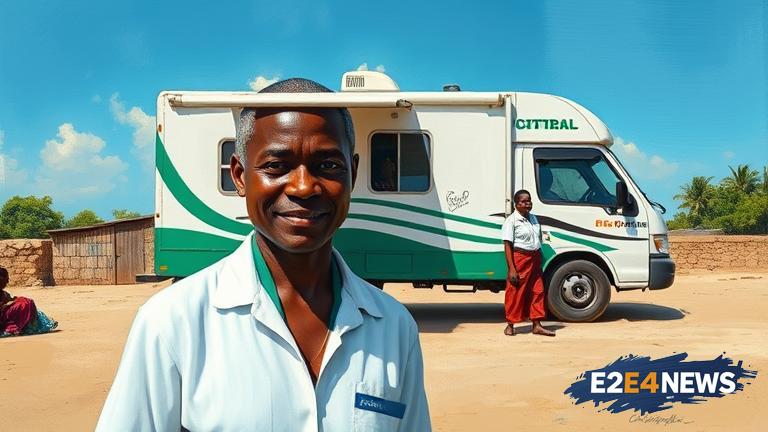The island nation of Comoros, located off the coast of East Africa, has long struggled with limited access to healthcare, particularly for women. However, thanks to the efforts of the United Nations Population Fund (UNFPA) and its partners, mobile clinics are now bringing essential services closer to those who need them most. These clinics, which travel to remote areas of the islands, offer a range of services, including prenatal care, family planning, and maternal healthcare. For many women in Comoros, these clinics are a lifeline, providing them with access to care that they would otherwise go without. The mobile clinics are staffed by trained healthcare professionals, who are dedicated to providing high-quality services to their patients. In addition to medical care, the clinics also offer education and counseling on reproductive health, empowering women to make informed decisions about their bodies and their futures. One of the key services offered by the mobile clinics is family planning, which is essential for reducing maternal and infant mortality rates. By providing women with access to contraception and other family planning methods, the clinics are helping to prevent unintended pregnancies and reduce the risk of complications during childbirth. The clinics are also working to address the issue of gender-based violence, which is a significant problem in Comoros. By providing support and counseling to survivors of violence, the clinics are helping to promote gender equality and empower women to take control of their lives. The impact of the mobile clinics is already being felt, with many women reporting improved health outcomes and increased confidence in their ability to care for themselves and their families. The clinics are also helping to reduce the number of maternal deaths, which is a major concern in Comoros. According to the World Health Organization, the country has one of the highest maternal mortality rates in the world, with many women dying during childbirth due to lack of access to medical care. The mobile clinics are helping to change this, by providing women with access to the care they need to stay healthy and safe during pregnancy and childbirth. In addition to the medical services they provide, the clinics are also helping to promote economic empowerment among women. By providing them with access to education and job training, the clinics are helping women to gain the skills and knowledge they need to support themselves and their families. The mobile clinics are also working to address the issue of cultural and social barriers, which can prevent women from accessing healthcare services. By engaging with community leaders and promoting cultural sensitivity, the clinics are helping to break down these barriers and promote greater understanding and acceptance of the importance of women’s health. Overall, the mobile clinics are having a profound impact on the lives of women in Comoros, providing them with access to essential healthcare services and empowering them to take control of their reproductive health. As the program continues to expand and grow, it is likely that even more women will be able to benefit from these life-changing services. The success of the mobile clinics is a testament to the power of partnership and collaboration, and demonstrates what can be achieved when organizations work together to address the needs of vulnerable populations. The UNFPA and its partners are committed to continuing their support for the mobile clinics, and to working towards a future where all women in Comoros have access to the healthcare services they need to thrive. With the help of these clinics, women in Comoros are finally able to receive the care they deserve, and are taking the first steps towards a brighter, healthier future. The mobile clinics are a shining example of the impact that can be achieved when healthcare services are brought directly to those who need them most. By providing women with access to essential services, the clinics are helping to promote health, empowerment, and economic growth, and are playing a critical role in the development of Comoros. As the country continues to grow and develop, it is likely that the mobile clinics will remain a vital part of the healthcare system, providing women with the care and support they need to succeed. The clinics are also helping to promote greater awareness and understanding of the importance of women’s health, and are working to reduce the stigma and discrimination that often surrounds reproductive health issues. By promoting education and awareness, the clinics are helping to create a more supportive and inclusive environment, where women feel empowered to take control of their health and wellbeing. The mobile clinics are a powerful reminder of the importance of investing in the health and wellbeing of women and girls, and demonstrate the significant impact that can be achieved when healthcare services are tailored to meet the unique needs of vulnerable populations. By supporting the mobile clinics, the UNFPA and its partners are helping to create a more just and equitable world, where all women have access to the healthcare services they need to thrive.





